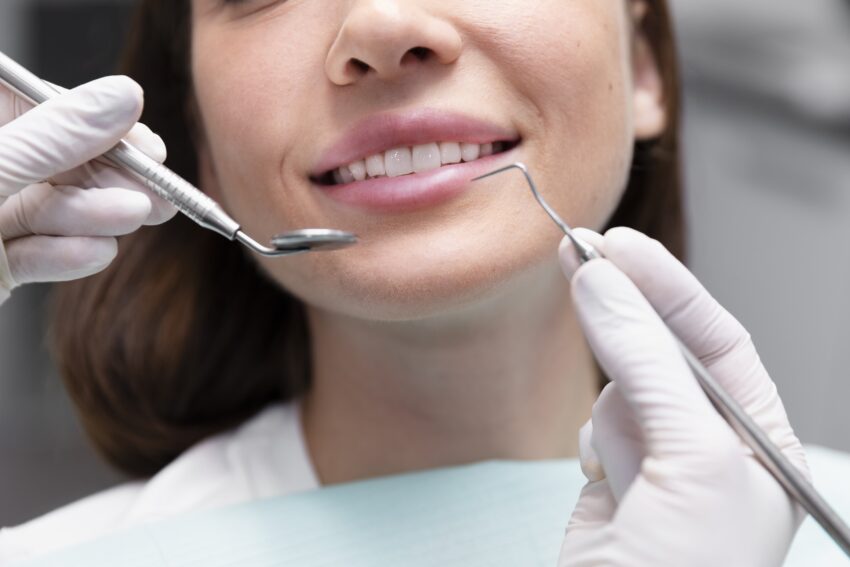The dental injection is a local anesthesia method applied to dental problems that require intervention. This technique, which is applied as a dental anesthesia injection, suppresses conduction in the patient’s peripheral nerves. Thanks to local anesthesia, sensory loss is created in the mouth and tooth region. In this way, the patient is prevented from feeling pain.
This technique, which is applied using dental anesthesia drugs, does not cause any harm to the patient. However, in some cases, symptoms of nerve damage after dental injection may be seen. If this situation is completely temporary and the loss of sensation still continues, it is recommended to consult with your specialist.
Table of Contents
Types of Dental Injection
The dental injection chart shows that more than one type of local anesthesia is applied to the mouth and dental region. For example, a different local anesthesia technique can be applied for dental injection for tooth extraction. Likewise, a more effective and different injection method can be preferred for dental implant treatment.
However, two different local anesthesia techniques applied in dentistry stand out in addition to all these. One of them is an injection using a medical injector (infiltration local anesthesia), and the other is an injector-free (topical anesthesia) technique.
1- Dental Injection with Injector – Infiltration Local Anesthesia
Injection sites are determined by your specialist dentist and are chosen to sensitize the nerves in the treatment area. In this technique, anesthesia drugs that are injected using an injector are generally used. This injector has a small tip and can cause a slight stinging sensation. But this feeling does not last very long and is completely temporary. Even after the effect of the anesthetic wears off, it is very rare to experience any residual pain from the injection. However, some patients may complain to their doctors, such as dental injection pain after a week. In this case, the patient may first seek symptoms of nerve damage after dental injection.
After this anesthesia application, the problematic tooth area will be numb for at least 4-5 hours. Therefore, in order to observe conditions such as nerve damage, at least 4-5 hours must have passed after the procedure.
 2- Dental Anesthesia without Injector – Topical Anesthesia
2- Dental Anesthesia without Injector – Topical Anesthesia
Another type of local anesthesia in dentistry is anesthesia without using an injector. This technique is generally applied to patients with a fear of injections. Some of our patients prefer to apply this technique in order not to feel the pain of the injector. At WestModern Clinic, we prefer to apply this local anesthesia technique.
With the local anesthesia technique applied without an injector, symptoms of nerve damage after dental injection are often avoided. In addition, dental injection site pain is not seen when this technique is applied.
In this method, absolutely no medical injector is used. With topical anesthesia, anesthetic drugs are applied to the area of the problematic tooth with a cotton-tipped applicator. After just a minute, it is possible for the area to become numb. In addition, in some cases, it is also possible to apply anesthetic drugs in gel or spray form.
3- What are the Drugs Used in Local Anesthesia?
Dentists use some drugs to numb the tooth, and they will intervene in the mouth area. These drugs, which are preferred for local anesthesia, may differ according to the patient’s general health status. If local anesthesia is to be applied for oral and dental treatment, it is first decided by which technique the anesthesia will be applied. After that, the most suitable drug for the patient is preferred and the inside of the mouth is anesthetized.
Drugs used to anesthetize the tooth are also usually:
- Prilocaine 20 mg
- Articain HCI 20 mg
- Articain HCI 40 mg
- Mepivacaine 30 mg
- Lidocaine 40 mg
The drugs we have listed above are the most commonly preferred drugs in local anesthesia. After examining you, your specialist dentist decides which drug to anesthetize. In the meantime, your dentist may also ask you about your chronic diseases and previous treatments. It is essential for you to answer all these questions correctly for the implementation of the treatment.
Symptoms of Nerve Damage After Dental Injection
Symptoms of nerve damage after dental injection can often be confused with the effect of local anesthesia. However, some patients may also experience nerve damage due to injection. In such a case, it is recommended to consult your specialist dentist immediately. Among the symptoms of nerve damage after dental injection, conditions such as long-term loss of sensation or dental injection site infection can be seen. At the same time, complaints such as dental injection site still hurts can be among the symptoms.
Among the symptoms of nerve damage after dental injection, the conditions listed below may also be included:
- Long-term loss of sensation in the area under local anesthesia
- Numbness feeling
- Tingling sensation
- Difficulty speaking
- Loss of taste
- Long-term pain sensation in the area where local anesthesia is applied
The conditions mentioned above can be symptoms of nerve damage after dental injection. However, as we have mentioned before, the appearance of these symptoms immediately after local anesthesia may not mean that there is nerve damage. Therefore, it would be more beneficial to first share with your doctor how long the symptoms have been going on.
At the same time, the treatment method applied to the tooth may cause temporary nerve damage. For example, after applications such as laminate dental veneers, temporary nerve damage may occur in the patient’s mouth area.


 2- Dental Anesthesia without Injector – Topical Anesthesia
2- Dental Anesthesia without Injector – Topical Anesthesia






